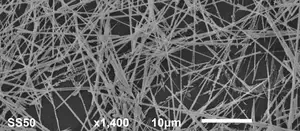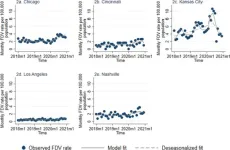(Press-News.org)
Imagine the body’s cells are well-behaved students in the classroom. The “teachers” are tumor suppressor genes, and they make sure cells follow the rules. But when tumor suppressor genes are away, cells may go astray.
With cells, this is a serious matter. Unregulated behavior can lead to uncontrolled growth and, ultimately, the development of cancer.
In an invited review article Wednesday (Nov. 1, 2023) in Cancer Discovery, a journal of the American Association for Cancer Research, Kathleen Mulvaney, assistant professor with the Fralin Biomedical Research Institute at VTC, talks about the potential of a new drug called MRTX1719 that has shown early promise in clinical trials for solid tumors by killing cancer cells with that lack specific tumor suppressor genes.
“This is an updated version of an important new class of drugs targeting the PRMT5 enzyme, which is the target protein we study in my lab,” said Mulvaney, a Virginia Tech cancer researcher who is not affiliated with Mirati Therapeutics Inc., the biotechnology company that published clinical results in Cancer Discovery.
Mulvaney accepted the invitation to write the commentary because of her enthusiasm for the new class of drug and its potential to help the 10 percent to 15 percent of human cancer patients who could benefit from these drugs based on their genetic deletion status.
The MRTX1719 drug targets cancers with a genetic vulnerability – the absence of tumor suppressor gene CDKN2A and its neighbor gene, MTAP. These missing genes can lead to uncontrolled cell growth, but the drug exploits this weakness to fight the cancer.
“This drug is an improvement because it binds to a specific part of the PRMT5 protein in a manner unique to cancer cells with the CDKN2A/MTAP gene deletion,” said Mulvaney, is also an assistant professor in the Department of Biomedical Sciences and Pathobiology in the Virginia-Maryland College of Veterinary Medicine. “The data from early testing looks promising for using this drug either alone or in combination with others in the future.”
In the Phase 1 and Phase 2 stages of clinical testing, researchers reported positive results in patients with specific types of cancer with the MTAP gene missing, including melanoma, gallbladder cancer, mesothelioma, lung cancer, and a type of nerve cancer called MPNST (Malignant Peripheral Nerve Sheath Tumor).
“What's remarkable is that it took just a few years to go from discovering the genetic issue in these cancers in 2016 to having a hopeful drug in clinical trials by 2023,” Mulvaney said. “This shows how genetic research and smart drug development can create effective cancer treatments. Through genomic screens, we can identify cancer’s Achilles heels and develop small molecules to target them.”
Earlier versions of PRMT5 inhibitors that reached clinical trials from 2016 to 2019 struggled with issues of toxicity in patients before the drugs could reach a therapeutically helpful dose, Mulvaney said.
But with the improvements, she said it is important to draw the field’s attention to a new class of MTA-cooperative PRMT5 inhibitors, which includes the drug MRTX1719 and others, because they are demonstrating they can effectively help in killing tumors while leaving the normal human cells unharmed.
Mulvaney’s lab is part of the Fralin Biomedical Research Institute in Washington, D.C., on the Children's National Research and Innovation Campus. Her lab is part of a growing collaborative research program between Fralin Biomedical Research Institute and Children’s National Hospital. She is also a member of the Virginia Tech Cancer Research Alliance.
END
The oxygen content of seawater has a profound impact on the cycling of bioessential elements and the habitability of Earth. But how and why the marine oxygen landscape (i.e., the spatial pattern of oxygen levels) evolved since the start of the Phanerozoic 538 million years ago is not well established.
To tackle this problem, researchers led by Prof. WANG Xiangli from the Institute of Geology and Geophysics of the Chinese Academy of Sciences (IGGCAS) and Prof. LI Chao from the Chengdu University of Technology, along with collaborators from the University of Cincinnati and the Nanjing Institute of Geology and Palaeontology, have reconstructed a nearly continuous record of ...
uIf your boss stomps and yells, criticizes you, and then proceeds to take the credit for your work – even it is an isolated incident – it can take a profound toll on employee well-being and performance. But despite the many years of research, the precise mechanisms through which bad leadership impacts employees’ performance remain a subject of interest.
In a new study, first published online Oct. 30 in Group & Organization Management, an international group of researchers, led by Stevens Institute of Technology and University of Illinois Chicago, offer a novel explanation of the cognitive factors through which abusive ...
A research team led by Cleveland Clinic and Oregon Health and Science University (OHSU) has developed a new method for mapping how the parts of the brain "speak" to each other, critical to understanding behavior changes in patients with neurological disease.
Diseases like Alzheimer's disease change how patients communicate and act, affecting their relationships and well-being. Cleveland Clinic's Hod Dana, PhD, is collaborating with Jacob Raber, PhD, an OHSU behavioral neuroscientist, on ...
UTA will soon add a new piece of cutting-edge equipment to its already impressive and growing research armamentarium—a type of super-resolution microscope (SRM) that allows biologists to see structures within a cell in even finer detail.
The SRM will come to UTA because of additional grant funding from the National Institutes of Health (NIH) to the lab of Piya Ghose, an assistant professor of biology at UTA. This nearly $250,000 award supplements Ghose’s existing NIH/National Institute of General Medical ...
(SACRAMENTO, Calif.) — Domestic violence went down or stayed the same during the first 10 months of the COVID-19 pandemic in five major U.S. cities. However, domestic violence involving firearms increased in three of those cities, according to a new UC Davis study published in the Journal of Family Violence.
“The increase in firearm domestic violence is concerning, as abuser firearm access is a risk factor for lethality,” said Elizabeth Tomsich, a research data analyst at the UC Davis Violence Prevention Research Center and ...
Microbial communities growing on plastic debris in rivers may have the capacity to harbour potentially pathogenic microbes and act as reservoirs of antimicrobial resistance genes, according to a study published in Microbiome. The findings also highlight differences in the potential pathogens and antimicrobial resistance genes that new and degraded plastics may have the capacity to harbour.
Vinko Zadjelovic, Elizabeth Wellington, Joseph Christie-Oleza and colleagues characterised the microbial communities found on the surface ...
An early phase in the process of developing Alzheimer’s disease is a metabolic increase in a part of the brain called the hippocampus, report researchers from Karolinska Institutet in a study published in Molecular Psychiatry. The discovery opens up for new potential methods of early intervention.
Alzheimer’s disease is the most common form of dementia and strikes about 20,000 people in Sweden every year. Researchers now show that a metabolic increase in the mitochondria, the cellular power ...
Researchers from Queen Mary University of London have gathered detailed insights from the British South Asian community that could lead to more successful implementation of genetic testing to help tailor the use of routine medications. Their findings are published today (1 November 2023) in The Pharmacogenomics Journal and indicate key issues that could affect the take up of this new type of genetic testing amongst patients.
Despite comprising 10% of the British population, individuals of South Asian heritage have historically been under-represented in ...
Cigarette style graphic warning labels could reduce people’s meat consumption, according to new research published today (1 November).
The study suggests the use of warning labels on meat options could improve public health and reduce the UK’s carbon footprint.
The team from Durham University tested a range of warning labels including those which warn people of the damage to climate, health, and risk of pandemics. They found that all labels were effective at discouraging people from choosing meals with meat.
All warning labels, which showed ...
A new study has concluded that any credible net zero pathway for Brazil must include the implementation of nature-based solutions.
Actions such as halting deforestation and large-scale restoration of native vegetation would have immediate impact, at a fraction of the cost of carbon-negative technologies.
However, stronger policy frameworks will be needed if nature-based solutions are to achieve their full potential in Brazil.
Without the implementation of nature-based solutions, in particular ending deforestation and restoring ...






